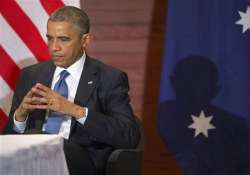Barack Obama wants more regulation of Internet providers
Washington: President Barack Obama on Monday embraced a radical change in how the government treats Internet service, coming down on the side of consumer activists who fear slower download speeds and higher costs but angering

Washington: President Barack Obama on Monday embraced a radical change in how the government treats Internet service, coming down on the side of consumer activists who fear slower download speeds and higher costs but angering U.S. cable giants who say the plan would kill jobs.
Obama called on the Federal Communications Commission to more heavily regulate Internet providers and treat broadband much as it would any other public utility. He said the FCC should explicitly prohibit Internet providers like Verizon and AT&T from charging data hogs like Netflix extra to move their content more quickly. The announcement sent cable stocks tumbling.
The FCC, an independent regulatory body led by political appointees, is nearing a decision on whether broadband providers should be allowed to cut deals with the content providers but is stumbling over the legal complexities.
“We are stunned the president would abandon the longstanding, bipartisan policy of lightly regulating the Internet and calling for extreme” regulation, said Michael Powell, president and CEO of the National Cable and Telecommunications Association, the primary lobbying arm of the cable industry, which supplies much of the nation's Internet access.
This “tectonic shift in national policy, should it be adopted, would create devastating results,” added Powell, who chaired the FCC during the Bush administration until 2005.
Netflix swung behind Obama, posting to its Facebook page that “consumers should pick winners and losers on the Internet, not broadband gatekeepers.”
“Net neutrality” is the idea that Internet service providers shouldn't block, slow or manipulate data moving across its networks. As long as content isn't against the law, such as child pornography or pirated music, a file or video posted on one site will load generally at the same speed as a similarly sized file or video on another site.
In 2010, the FCC embraced the concept in a rule. But last January, a federal appeals court struck down the regulation because the court said the FCC didn't technically have the legal authority to tell broadband providers how to manage their networks.
Obama said the FCC should explicitly ban any “paid prioritization” on the Internet. The president also suggested that the FCC reclassify consumer broadband as a public utility under the 1934 Communications Act. That would mean the Internet would be regulated more heavily in the way phone service is.